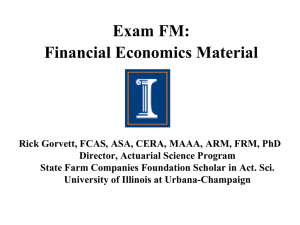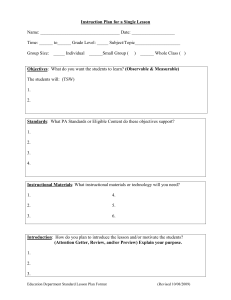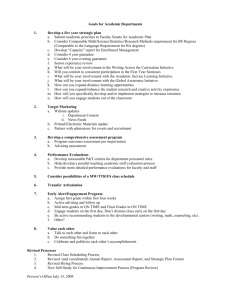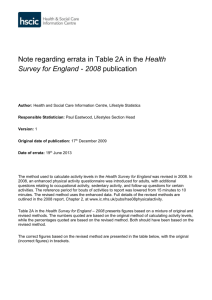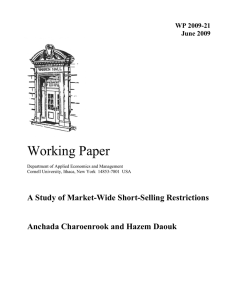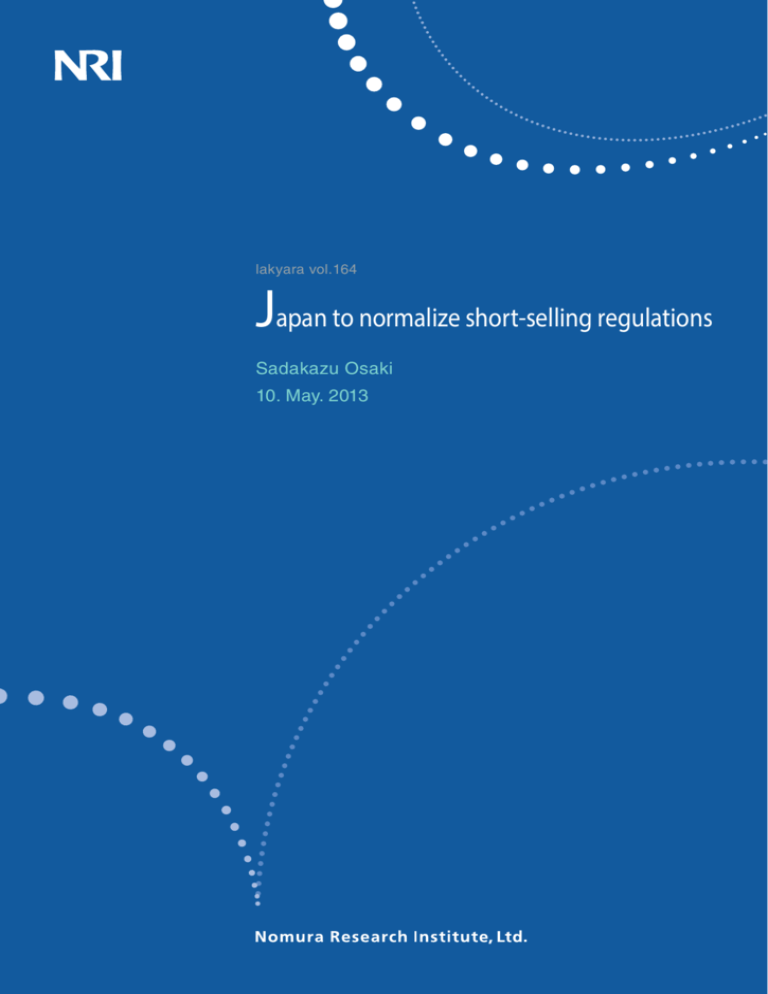
lakyara vol.164
Japan to normalize short-selling regulations
Sadakazu Osaki
10. May. 2013
Japan to normalize short-selling regulations
vol.164
Executive Summary
Japan's Financial Services Agency has unveiled plans to rescind
the emergency short-selling restrictions imposed during the 2008
financial crisis and replace them with revised permanent regulations.
Its proposed revisions are timely and sensible. They should help to
improve market liquidity and price formation.
Sadakazu Osaki
Head of Research
Center for Strategic Management
and Innovation
Emergency short-selling restrictions have remained in effect in Japan
In March 2013, Japan's Financial Services Agency (FSA) released a draft
of revised short-selling regulations. In Japan, short-selling restrictions were
tightened as an emergency measure in response to the market turmoil triggered
by Lehman Brothers' September 2008 collapse. These emergency restrictions
are still in effect, having been extended 12 times. With the recently released
revised regulations slated to take effect in November, regulation of short-selling in
Japanese markets is set to finally return to normal.
Short selling is an investment technique whereby an investor borrows from a
third party securities that he does not currently own and sells them in the aim of
repurchasing them later at a lower price. When a security is sold short, its market
price reflects the investment opinion of investors that do not own the security in
the cash market. Short selling also enhances market liquidity by increasing sell
orders.
It thus fulfills a legitimate economic function but it can also trigger steep price
declines if certain stocks are heavily sold short within a short timeframe. Such
intensive short-selling can cause market dislocations and would likely constitute
unfair market manipulation. At the time of the 2008 financial crisis in particular,
rampant speculative short-selling was seen as a problem in markets throughout
the world. Many countries banned short selling of designated stocks.
Even before the 2008 crisis, Japan had required flagging and verification of short
sales and adopted an "uptick rule" prohibiting short sales unless the sale was
executed at a price above the immediately preceding trade's execution price. In
©2013 Nomura Research Institute, Ltd. All Rights Reserved.
1
vol.164
Japan to normalize short-selling regulations
2008, Japan imposed a ban on naked short-selling (selling securities short without
having borrowed and actually taken possession of the securities) and reporting/
disclosure requirements for short positions that exceed certain size thresholds.
American and European countries subsequently rescinded their emergency shortselling restrictions and revised their permanent regulations. Japan, by contrast,
has failed to do so, partly due to unforeseen circumstances in the form of the
catastrophic earthquake of March 11, 2011.
Content of revised regulations
Following are the major points of the revised regulations proposed by the FSA.
(1)The reporting and disclosure requirements imposed as an emergency
measure in 2008 would be made permanent. Short sellers would be required
to report any short positions that exceed 0.2% of a stock's issued shares
and publicly disclose any short positions that exceed 0.5% of the issued
share count. They would also be required to report changes in short positions
whenever a previously reported short position increases to above 0.3%, 0.4%,
or 0.5%, or is reduced below 0.2%, of the issued share count. Additionally,
short sellers would be required to publicly disclose whenever a previously
reported 0.5%-or-larger position is reduced below 0.5%.
(2)The price restrictions on short selling that were permanently in effect before
2008 would be revised to make the previous uptick rule subject to a trigger.
Specifically, the uptick rule would be triggered when a stock trades at a price
more than 10% below its closing price on the previous trading day. Once the
uptick rule is triggered, it would remain in effect until the close of trading on
following trading day. This regulation would apply to not only stock exchanges
but also proprietary trading systems (PTS) currently exempt from the uptick
rule.
(3)The naked short-selling ban imposed as an emergency measure in 2008
would become permanent and apply to trading on PTSs also.
(4)The scope of short-sale flagging and verification requirements and regulation
of short selling in connection with seasoned equity offerings (Japan's version
©2013 Nomura Research Institute, Ltd. All Rights Reserved.
2
vol.164
Japan to normalize short-selling regulations
of US Regulation M, adopted in 2011) would be expanded to encompass
trading on PTSs.
Reforms should strengthen market function
Investor confidence has recently been resurgent in the Japanese equity market,
with stocks rallying sharply in the wake of November 2012 general election,
inauguration of the second Abe Cabinet, and growing optimism with respect to
"Abenomics," the new Cabinet's economic policy. In light of such, the revised
short-selling regulations are timely.
They are also well-balanced. While basically affirming short-selling's economic
significance, the revised regulations recognize that short selling can cause market
dislocations if markets are unstable. Additionally, they were drafted with the
benefit of hindsight vis-à-vis US and European regulatory reforms in the aftermath
of the financial crisis. In particular, the fact that the formerly always-in-effect uptick
rule would be triggered into effect only when prices have fallen sharply should
greatly improve the Japanese market liquidity and price formation.
In Japan, there is deep-seated support for artificial intervention in the markets,
including frequent advocacy of measures to prop up stock prices through such
means as establishing public entities to buy stocks. Short selling tends to be
Exhibit: Comparison of existing short-selling regulations and proposed revisions
Existing regulations
Revisions
Short-sale flagging/verification
requirements
Short sellers must notify broker if
sell order is for short sale and
broker must verify
Applicability to be expanded to
PTS trades
Price restrictions (uptick rule)
Short sales always prohibited
unless sale price is higher than
immediately preceding trade's
execution price
Uptick rule to apply only to stocks
down more than 10% from
previous day's closing price and
remain in effect only through next
trading day
Naked short-selling ban
Temporary ban (emergency
measure)
Permanent ban
Position reporting/disclosure
requirements
Short positions must be
reported/disclosed if they exceed
0.25% of issued share count
(emergency measure)
Short positions must be reported
if they exceed 0.2%, and publicly
disclosed if they exceed 0.5%, of
issued share count (permanent
measure)
Short-selling restrictions related to Ban against using newly issued
equity offerings
shares to cover short positions
initiated after announcement of
equity offering
Applicability to be expanded to
PTS trades
Source: NRI
©2013 Nomura Research Institute, Ltd. All Rights Reserved.
3
Japan to normalize short-selling regulations
vol.164
frowned upon on the grounds that it destabilizes markets. However, excessive
restriction of short selling, which entails buying back shorted shares at a later
date, can paradoxically accelerate market declines. The FSA's revised shortselling regulations should facilitate fair short-selling and contribute to strengthening
market function.
©2013 Nomura Research Institute, Ltd. All Rights Reserved.
4
Japan to normalize short-selling regulations
vol.164
about NRI
Nomura Research Institute, Ltd. (“NRI”, TYO: 4307) is an independent, global IT
solutions and consulting services provider with annual sales of 335.5 billion yen
as of FY ended March 2012. With front-to-back support for the buy- and sellside, NRI’s tradition of innovation has positioned them as a trusted international
market leader. Leveraging NRI’s global consulting business, NRI is able to provide
innovative financial IT solutions for investment banks, asset managers, banks and
insurance providers. For more information, visit www.nri.com.
The entire content of this report is subject to copyright with all rights reserved.
The report is provided solely for informational purposes for our UK and USA readers and is not to be construed as
providing advice, recommendations, endorsements, representations or warranties of any kind whatsoever.
Whilst every effort has been taken to ensure the accuracy of the information, NRI shall have no liability for any loss or
damage arising directly or indirectly from the use of the information contained in this report.
Reproduction in whole or in part use for any public purpose is permitted only with the prior written approval of Nomura
Research Institute, Ltd.
Inquiries to :Financial Technology and Market Research Department
Nomura Research Institute, Ltd.
Marunouchi Kitaguchi Bldg.
1-6-5 Marunouchi, Chiyoda-ku, Tokyo 100-0005, Japan
E-mail : kyara@nri.co.jp
http://www.nri.co.jp/english/opinion/lakyara
©2013 Nomura Research Institute, Ltd. All Rights Reserved.
5

